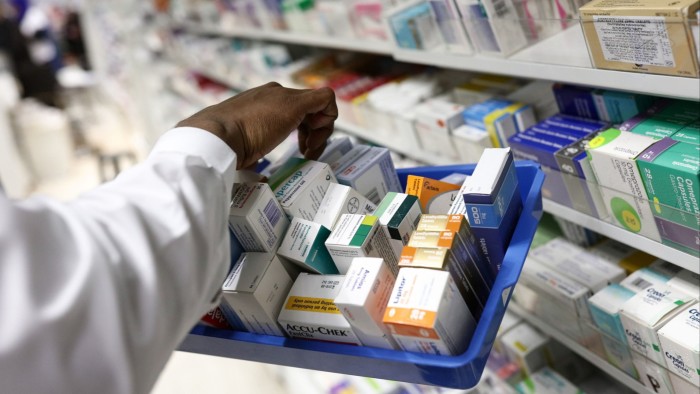Unlock the Editor’s Digest for free
Roula Khalaf, Editor of the FT, selects her favourite stories in this weekly newsletter.
Drugmakers are growing frustrated with the NHS after a clawback tax unexpectedly soared, with pharmaceutical companies warning that investment in the UK may be at risk.
The industry association’s chief executive and board met with health secretary Wes Streeting last week to complain about having to pay 22.9 per cent of their UK sales back to the government this year, far more than the 15 per cent predicted.
The tax rate changes annually and the new rate surprised drugmakers when it was published late last year, after they had made their budgets for this year.
In 2024, the rebate tax was 15.1 per cent, and the year before that, under the previous agreement between the health department and the industry, it was 26.5 per cent.
NHS England said purchases of potentially curative cell and gene therapies, and medicines for conditions including cancer, diabetes, eye diseases rose more than expected in 2024, which led to the rise in the tax rate.
Richard Torbett, chief executive of the Association of the British Pharmaceutical Industry, said he would like to review the deal, as the UK lags behind other European countries in what it pays for drugs, putting it in a “very very difficult position” if it wants to grow its life sciences industry.
“There comes a point where the NHS has to be at least in the ballpark of being a good customer. Not necessarily the best in the world, but it is really hard if the NHS is the worst,” he said.
“We can only continue to add billions to GDP in this country and create more medicines for the future if we make sure the system is working well for life sciences,” Torbett added.
One senior figure at a major pharmaceutical company said the impasse was already making the company reconsider investment in clinical trials and the launch of new drugs in the UK.
The person warned that the higher rate of taxation would challenge Streeting’s goal of positioning health as a “growth department”, adding that it sent a “‘do not invest here” sign to life sciences.
Fiona Bride, interim chief commercial officer at NHS England, said the voluntary scheme for branded medicines pricing and access had been a “triple win” for patients, taxpayers, and the life sciences sector.
She added that the higher rate showed the deal is working as intended because it is delivering more new medicines to patients. Estimated sales of new drugs rose from £7.8bn in 2023 to £8.9bn in 2024.
“The NHS is delivering more newer branded drugs to patients as companies have brought forward new innovative treatments at cost effective prices,” she said.
The UK is home to world-leading scientific research, particularly in the ‘Golden Triangle’ of Oxford, Cambridge and London, and large pharmaceutical companies AstraZeneca and GSK.
But efforts to encourage the life sciences industry to grow have faltered because of concerns over the NHS not adopting new medicines quickly enough and paying less than other countries.
Germany charges the industry a similar clawback tax but recently lowered it to 7 per cent of sales and Ireland’s tax is 9 per cent.
After months of tense negotiations in 2023, the pharmaceutical industry and the government reached an agreement on a five-year deal on pricing.
The senior figure at a pharmaceutical group said that when the tax deals were signed last year, only the Department of Health was able to provide modelling, and the scenarios presented to pharmaceutical companies were “misleading”.
They added that pharmaceutical groups were frustrated because the NHS had received its biggest cash injection in decades in the Autumn Budget. “A massive budget increase has been given with zero added to the medicines budget,” they said.
“The pharma industry are really pissed off,” said one person familiar with the matter.
Mark Dayan, head of public affairs at the think-tank the Nuffield Trust, said the agreement was based on the principle of variable rates based on sales trends for newer medicines.
“This provides an element of predictability and control over the medicines bill and in all four countries of the UK, the NHS budget is extremely tight, often with overspends, so it will be a difficult conversation to think about reopening that deal so soon after it was signed,” he said.
But he said this rise is close to the clawback rates seen in the last year of the old deal, which were hitting up against the limits of what was acceptable to pharma companies.
The Department of Health said the pharmaceutical sector plays a vital role supporting the NHS and boosting UK growth: “We look forward to continuing to work in partnership with companies to tackle these together wherever we can”.
Read the full article here

